| Listing 1 - 10 of 14 | << page >> |
Sort by
|
Book
ISBN: 9021405687 9789021405681 Year: 1990 Volume: *62 Publisher: Amsterdam Querido
Abstract | Keywords | Export | Availability | Bookmark
 Loading...
Loading...Choose an application
- Reference Manager
- EndNote
- RefWorks (Direct export to RefWorks)
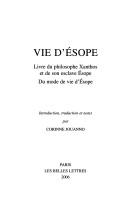
ISSN: 11504129 ISBN: 2251339477 9782251339474 Year: 2006 Volume: 47 Publisher: Paris : Les Belles Lettres,
Abstract | Keywords | Export | Availability | Bookmark
 Loading...
Loading...Choose an application
- Reference Manager
- EndNote
- RefWorks (Direct export to RefWorks)
Biographie fantaisiste d'un auteur semi-légendaire, la Vie d’Ésope raconte l’étonnante ascension d’un misérable esclave, que son intelligence rusée et le soutien des dieux hissent peu à peu au niveau des grands de ce monde, mais qui, tel un héros de tragédie, périt, victime de son hybris, d’une fin de bouc émissaire. Assemblage composite d’éléments dont les plus anciens remontent à l’époque classique, l’œuvre a pris sa forme actuelle au début de notre ère, au moment même où s’épanouit le roman grec. Mais elle a pour héros un personnage qui, par son incroyable laideur et ses origines serviles, est aux antipodes des séduisants et aristocratiques jeunes premiers du roman grec, et fait figure de « marginal » culturel, protagoniste hors norme d’une œuvre volontiers subversive où figures d’autorités et représentants de la haute culture sont assez durement mis à mal. Comme bien d’autres textes populaires, que ne protégeait pas le respect des copistes, la Vie d’Ésope a fait l’objet d’adaptations successives au fil des siècles : c’est la version la plus ancienne, celle du manuscrit de Grottaferrata (G), qui est traduite ici en français pour la première fois – accompagnée d’extraits des rédactions ultérieures grâce auxquels le lecteur pourra apprécier comment la légende d’Ésope a été progressivement assagie par les remanieurs.
Fables, Greek --- Authors, Greek --- Fables grecques --- Ecrivains grecs --- History and criticism. --- Biography. --- Histoire et critique --- Biographie --- Life of Aesop. --- Aesop's fables. --- Classical Greek literature --- Critical edition --- Aesop. --- Critical edition. --- History and criticism --- Aesopus --- Ezop --- Esop --- Esopo --- Esope --- Aisōpos --- Esopus --- Ezovbos --- Ezopos --- Īcāp --- Isop --- אזוף --- אזופוס --- איסופוס --- עזאפ --- イソップ --- 伊索 --- Aesop --- Aesopi --- Äsop --- Acqui 2006
Book
ISBN: 9780691144573 9780691144580 Year: 2011 Volume: *8 Publisher: Princeton ; Oxford Princeton University Press
Abstract | Keywords | Export | Availability | Bookmark
 Loading...
Loading...Choose an application
- Reference Manager
- EndNote
- RefWorks (Direct export to RefWorks)
Fables, Greek --- Greek prose literature --- Literary form --- Literature and society --- Popular culture and literature --- Popular culture --- History and criticism. --- History --- Aesop --- Influence. --- Aesop's fables. --- Culture, Popular --- Mass culture --- Pop culture --- Popular arts --- Communication --- Intellectual life --- Mass society --- Recreation --- Culture --- Literature and popular culture --- Literature --- Literature and sociology --- Society and literature --- Sociology and literature --- Sociolinguistics --- History and criticism --- Social aspects --- Aesopus --- Ezop --- Esop --- Esopo --- Esope --- Aisōpos --- Esopus --- Ezovbos --- Ezopos --- Īcāp --- Isop --- אזוף --- אזופוס --- איסופוס --- עזאפ --- イソップ --- 伊索 --- Aisōpou mythoi --- Fables of Aesop --- Fabulae Aesopi --- Īcāp kataikaḷ --- Aesop in Mexico --- Μῦθοι (Aesop's fables) --- Mythoi (Aesop's fables) --- Corpus Fabularum Aesopicarum --- Aesopi --- Äsop
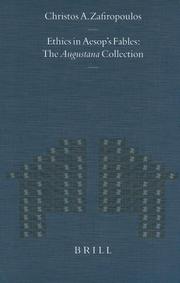
ISBN: 9004118675 9004351043 9789004118676 Year: 2001 Volume: 216 Publisher: Leiden : E.J. Brill,
Abstract | Keywords | Export | Availability | Bookmark
 Loading...
Loading...Choose an application
- Reference Manager
- EndNote
- RefWorks (Direct export to RefWorks)
Ethics in Aesop’s Fables: the Augustana Collection offers an original and innovative analysis of the Greek fable in the framework of Greek ethical thinking. The book starts with a brief account of the history and genre of the Greek fable. It then focuses on the Augustana collection of prose fables and analyses its ethical content in the larger context of Greek thought. A detailed comparison of Greek ethical thinking with the language of the fables shows the persistence of certain types of ethical reasoning and of certain key ethical norms. The author argues that although the fable was not 'philosophy', it was indeed 'philosophical' because it communicated normative messages about human behaviour, which reflected widespread views in Greek ethical thought. This book is of special interest to both students and scholars of Greek fable and of Greek philosophy.
Fables, Greek --- Ethics, Ancient, in literature --- Fables grecques --- Morale ancienne dans la littérature --- History and criticism --- Histoire et critique --- Aesop's fables --- Ethics, Ancient, in literature. --- History and criticism. --- -Greek fables --- Aesop --- -Aesopus --- Ezop --- Esop --- Esopo --- Esope --- Aisōpos --- Esopus --- Ezovbos --- Ezopos --- Īcāp --- Isop --- אזוף --- אזופוס --- איסופוס --- עזאפ --- イソップ --- 伊索 --- Influence --- Influence. --- Aesop's fables. --- -History and criticism --- -Influence --- Morale ancienne dans la littérature --- Aesopus --- Aisōpou mythoi --- Fables of Aesop --- Fabulae Aesopi --- Īcāp kataikaḷ --- Aesop in Mexico --- Μῦθοι (Aesop's fables) --- Mythoi (Aesop's fables) --- Corpus Fabularum Aesopicarum --- Aesopi --- Äsop --- Fables, Greek - History and criticism.
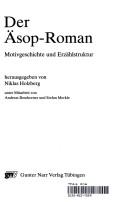
ISBN: 3823348655 Year: 1992 Publisher: Tübingen : Narr,
Abstract | Keywords | Export | Availability | Bookmark
 Loading...
Loading...Choose an application
- Reference Manager
- EndNote
- RefWorks (Direct export to RefWorks)
87.04 --- Fables, Greek --- -Fables, Latin --- -Latin fables --- Greek fables --- Klassieke literatuur: thema's --- History and criticism --- Aesop --- -Aesopus --- Ezop --- Esop --- Esopo --- Esope --- Aisōpos --- Esopus --- Ezovbos --- Ezopos --- Īcāp --- Isop --- אזוף --- אזופוס --- איסופוס --- עזאפ --- イソップ --- 伊索 --- Influence --- Fables, Latin --- History and criticism. --- Influence. --- Aesop's fables. --- -Klassieke literatuur: thema's --- -Influence --- 87.04 Klassieke literatuur: thema's --- -87.04 Klassieke literatuur: thema's --- Latin fables --- Aesopus --- Aisōpou mythoi --- Fables of Aesop --- Fabulae Aesopi --- Īcāp kataikaḷ --- Aesop in Mexico --- Μῦθοι (Aesop's fables) --- Mythoi (Aesop's fables) --- Corpus Fabularum Aesopicarum --- Aesopi --- Äsop
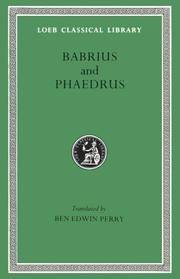
ISBN: 0674994809 9780674994805 Year: 2014 Publisher: Cambridge, MA : Harvard University Press,
Abstract | Keywords | Export | Availability | Bookmark
 Loading...
Loading...Choose an application
- Reference Manager
- EndNote
- RefWorks (Direct export to RefWorks)
Babrius's humorous and pointed fables in Greek verse probably date from the first century CE. From the same period come the lively fables in Latin verse written by Phaedrus, which satirize social and political life in Augustan Rome.
Languages & Literatures --- Greek & Latin Languages & Literatures --- Classical poetry --- Classical poetry. --- Fables, Classical --- Fables, Classical. --- Influence (Literary, artistic, etc.) --- Artistic impact --- Artistic influence --- Impact (Literary, artistic, etc.) --- Literary impact --- Literary influence --- Literary tradition --- Tradition (Literature) --- Art --- Influence (Psychology) --- Literature --- Intermediality --- Intertextuality --- Originality in literature --- Classical fables --- Classical literature --- Translations into English. --- Stories, plots, etc. --- Aesop --- Ezop --- Esop --- Esopo --- Esope --- Aisōpos --- Esopus --- Ezovbos --- Ezopos --- Īcāp --- Isop --- אזוף --- אזופוס --- איסופוס --- עזאפ --- イソップ --- 伊索 --- Influence. --- Aesop's fables --- Aisōpou mythoi --- Fables of Aesop --- Fabulae Aesopi --- Īcāp kataikaḷ --- Aesop in Mexico --- Parodies, imitations, etc. --- Μῦθοι (Aesop's fables) --- Mythoi (Aesop's fables) --- Corpus Fabularum Aesopicarum --- Aesopi --- Äsop
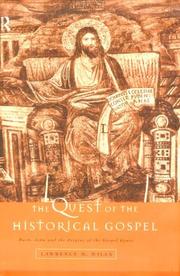
ISBN: 0415150930 Year: 1997 Publisher: Andover Routledge
Abstract | Keywords | Export | Availability | Bookmark
 Loading...
Loading...Choose an application
- Reference Manager
- EndNote
- RefWorks (Direct export to RefWorks)
Aesop. --- Bible. --- Criticism, Form. --- 226.3 --- 226.5 --- Evangelie volgens Marcus --- Evangelie volgens Johannes --- Aesopus --- Ezop --- Esop --- Esopo --- Esope --- Aisōpos --- Esopus --- Ezovbos --- Ezopos --- Īcāp --- Isop --- אזוף --- אזופוס --- איסופוס --- עזאפ --- イソップ --- 伊索 --- Marco (Book of the New Testament) --- Mark (Book of the New Testament) --- Markus (Book of the New Testament) --- Markusevangelium --- Vangelo di Marco --- Jean (Book of the New Testament) --- Johanisi (Book of the New Testament) --- Johannesevangelium --- John (Book of the New Testament) --- Yohan pogŭm --- Yohane den (Book of the New Testament) --- Yūḥannā (Book of the New Testament) --- Book of Mark --- Ioganaĭ (Book of the New Testament) --- Иоганай (Book of the New Testament) --- Aesop --- Aesopi --- Äsop
Book
ISBN: 1283088827 9786613088826 1400836565 9781400836567 9781283088824 9780691144573 0691144575 9780691144580 0691144583 Year: 2011 Publisher: Princeton, N.J. Oxford
Abstract | Keywords | Export | Availability | Bookmark
 Loading...
Loading...Choose an application
- Reference Manager
- EndNote
- RefWorks (Direct export to RefWorks)
Examining the figure of Aesop and the traditions surrounding him, Aesopic Conversations offers a portrait of what Greek popular culture might have looked like in the ancient world. What has survived from the literary record of antiquity is almost entirely the product of an elite of birth, wealth, and education, limiting our access to a fuller range of voices from the ancient past. This book, however, explores the anonymous Life of Aesop and offers a different set of perspectives. Leslie Kurke argues that the traditions surrounding this strange text, when read with and against
Literature and society --- Literary form --- Popular culture and literature --- Popular culture --- Fables, Greek --- Greek prose literature --- Literature --- Literature and sociology --- Society and literature --- Sociology and literature --- Sociolinguistics --- Literature and popular culture --- Culture, Popular --- Mass culture --- Pop culture --- Popular arts --- Communication --- Intellectual life --- Mass society --- Recreation --- Culture --- History --- History and criticism. --- Social aspects --- Aesop --- Influence. --- Aesop's fables. --- Aisōpou mythoi --- Fables of Aesop --- Fabulae Aesopi --- Īcāp kataikaḷ --- Aesop in Mexico --- Μῦθοι (Aesop's fables) --- Mythoi (Aesop's fables) --- Corpus Fabularum Aesopicarum --- Ezop --- Esop --- Esopo --- Esope --- Aisōpos --- Esopus --- Ezovbos --- Ezopos --- Īcāp --- Isop --- אזוף --- אזופוס --- איסופוס --- עזאפ --- イソップ --- 伊索 --- Aesopi --- Äsop
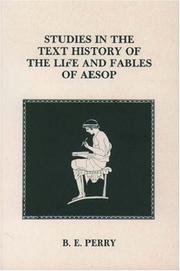
ISBN: 0891305343 9780891305347 Year: 1981 Volume: 7 Publisher: Chico, Calif. Scholars Press
Abstract | Keywords | Export | Availability | Bookmark
 Loading...
Loading...Choose an application
- Reference Manager
- EndNote
- RefWorks (Direct export to RefWorks)
Aesopus --- Authors, Greek --- Fables, Greek --- Biography --- Criticism, Textual --- Aesop --- Aesop's fables --- 091 AESOPUS --- 093 AESOPUS --- 094 AESOPUS --- -Fables, Greek --- -Greek fables --- Greek authors --- Handschriftenkunde. Handschriftencatalogi--AESOPUS --- Incunabelen. Incunabelkunde--AESOPUS --- Oude en merkwaardige drukken. Kostbare en zeldzame boeken. Preciosa en rariora--AESOPUS --- Ezop --- Esop --- Esopo --- Esope --- Aisōpos --- Esopus --- Ezovbos --- Ezopos --- Īcāp --- Isop --- אזוף --- אזופוס --- איסופוס --- עזאפ --- イソップ --- 伊索 --- -Handschriftenkunde. Handschriftencatalogi--AESOPUS --- 094 AESOPUS Oude en merkwaardige drukken. Kostbare en zeldzame boeken. Preciosa en rariora--AESOPUS --- 093 AESOPUS Incunabelen. Incunabelkunde--AESOPUS --- 091 AESOPUS Handschriftenkunde. Handschriftencatalogi--AESOPUS --- Greek fables --- Aesop. --- Aisōpou mythoi --- Fables of Aesop --- Fabulae Aesopi --- Īcāp kataikaḷ --- Aesop in Mexico --- Criticism, Textual. --- Μῦθοι (Aesop's fables) --- Mythoi (Aesop's fables) --- Corpus Fabularum Aesopicarum --- Aesopi --- Äsop --- Authors, Greek - Biography --- Fables, Greek - Criticism, Textual
Book
ISBN: 8774924087 9788774924081 Year: 1983 Volume: 6 Publisher: Odense : Odense university press = Odense Universitetsforlag,
Abstract | Keywords | Export | Availability | Bookmark
 Loading...
Loading...Choose an application
- Reference Manager
- EndNote
- RefWorks (Direct export to RefWorks)
Didactic poetry --- Fables, Greek --- Fables, Scottish --- Animals in literature --- Ethics in literature --- History and criticism --- Adaptations --- Henryson, Robert, --- Roman de Renart --- Aesop's fables --- -Fables, Scottish --- -Scottish poetry --- -Didactic poetry --- -Poetry --- Scottish literature --- Scottish fables --- Greek fables --- -History and criticism --- Greek influences --- Henryson, Robert --- Aesop --- -Aesopus --- Ezop --- Esop --- Esopo --- Esope --- Aisōpos --- Esopus --- Ezovbos --- Ezopos --- Īcāp --- Isop --- אזוף --- אזופוס --- איסופוס --- עזאפ --- イソップ --- 伊索 --- Influence --- -Adaptations --- -Influence --- Animals in literature. --- Ethics in literature. --- History and criticism. --- Influence. --- Roman de Renart. --- Aesop's fables. --- Poetry --- Adaptations&delete& --- Aesopus --- Reinaert --- Aisōpou mythoi --- Fables of Aesop --- Fabulae Aesopi --- Īcāp kataikaḷ --- Aesop in Mexico --- Μῦθοι (Aesop's fables) --- Mythoi (Aesop's fables) --- Corpus Fabularum Aesopicarum --- Aesopi --- Äsop --- Didactic poetry - History and criticism --- Fables, Greek - Adaptations - History and criticism --- Fables, Scottish - History and criticism --- Henryson, Robert, - 1430?-1506? - Morall fabillis of Esope the Phrygian --- Henryson (robert) --- Critique et interpretation
| Listing 1 - 10 of 14 | << page >> |
Sort by
|

 Search
Search Feedback
Feedback About UniCat
About UniCat  Help
Help News
News